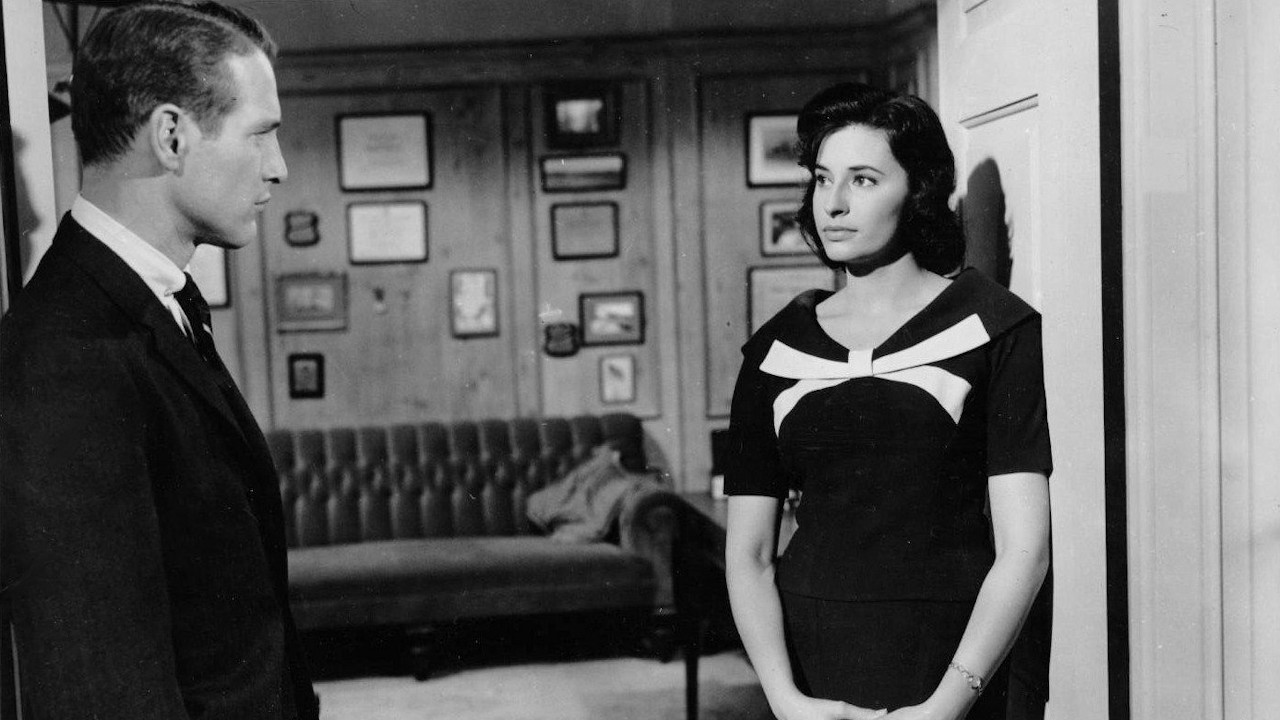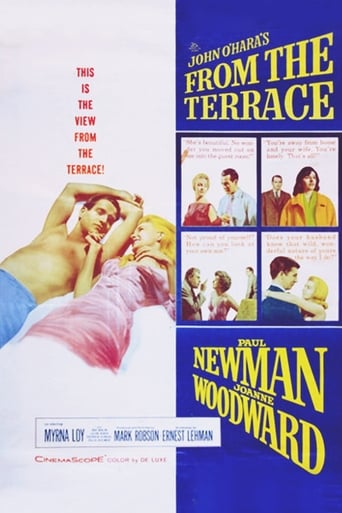Matialth
Good concept, poorly executed.
Peereddi
I was totally surprised at how great this film.You could feel your paranoia rise as the film went on and as you gradually learned the details of the real situation.
Bessie Smyth
Great story, amazing characters, superb action, enthralling cinematography. Yes, this is something I am glad I spent money on.
Sienna-Rose Mclaughlin
The movie really just wants to entertain people.
SimonJack
"From the Terrace" is an example of a type of the melodrama that Hollywood turned out from the late 1950s to early 1970s. Films such as this and "Peyton Place" of 1957, "Home from the Hill" of 1960, "Breakfast at Tiffany's" of 1961, and others came close to being soap operas. They had the good and the bad, often in the same person or people. The stories were different and usually interesting enough to hold an audience's attention. But the plots were definitely more melodramatic than good drama or story telling. Romance was usually a part of all of them, and most often they were about struggles in marriage, infidelity, family breakups, etc. The usual stuff of soapers, under various genres. This one is a lavish production by 20th Century Fox, based on a novel by John O'Hara. It hits on another theme that was common in the Mid- 20th century – after WW II and Korea. A man, striving to get ahead, becomes a workaholic and in the course neglects his wife. Not all wives are unfaithful to hubby, as is Joan Woodward's Mary St. John. And, not all men wind up unfaithful to their wives as does Paul Newman's David Eaton. Having seen this film when it came out in 1960, as I recall, I might have seen Newman as the poor hero and good guy whose wife dumps on him. But, it's amazing how time and a little maturity yields some wisdom. Because the blame for the breakup of the marriage here is definitely Newman's Eaton. He knew the woman he married, and his ambition and drive led him to forget her. It doesn't excuse her carousing and infidelity, but it shows what led to that. This film probably is viewed as very slow by 21st century audiences. It has some glamorous sets. The cast is very good, especially Joanne Woodward. She was one of the most talented actresses of the 20th century. Paul Newman was a fine leading man in a variety of genres, and a good entertainer. But his acting wasn't anything exceptional. The young Ina Balin won a Golden Globe as the most promising newcomer in 1960. She was in some good movies after this, but her star never quite reached to the heavens. She died at age 52 of a heart problem.Others of the supporting cast are very good. Leon Ames has a fine role as Samuel Eaton and Myrna Loy has a small part as his wife, Martha Eaton. Elizabeth Allen is the flamboyant, brassy rich broad, Sage Rimmington. She plays the part well, and it's the only way to describe her. Patrick O'Neal is Mary St. John's lover on the side. Felix Aymer is very good as David Eaton's boss and the head of the blue blood, Wall Street, and wealthy MacHardie's, James Duncan MacHardie. In an exchange with Eaton, MacHardie articulates a wise philosophy that had guided civilization for centuries. James MacHardie, "There are no grounds for divorce. And if you need my personal theology, infidelity is the lesser sin. I will do anything in my power to prevent a divorce." David Alfred Eaton, "Including condoning infidelity?" MacHardie, "I consider your word 'condoning' disrespectful. I condone none of it. The problem of infidelity is between husband and wife and God. The problem of divorce concerns the whole of civilization. What is marriage? An exchange of vows, a contract. It is my duty to myself and to any man who is working for me to demand that he honor all of his contracts. When you came here, you found out that we always honor our word, even if it means taking a loss." Many of these films, of course, are about well-to-do if not outright filthy rich people. In this film, David and Mary live a high life style. One might wonder where they got the money in their early stage. But, they live and socialize in high society, and among the young rich – two different groups. I don't know how that may resonate with audiences in the 21st century, when most people seem to live as much for fun and entertainment as for family or other things. But back then, the folks who lived the high life were quite distant from the vast majority of people, and they often were the envy of the common man.
George Redding
In this story from 20th Century Fox about a young man returning from his tour of duty after WWII and then working to climb to the top of the ladder with a top New York business firm, Paul Newman, his wife Joanne Woodward, and Ina Balin seem to perform great acting feats. In a sentence, the story is about, again, an ex-soldier, David Alfred Eaton, trying to make it to the top in the business world, but is mistreated by his boisterous, arrogant father Samuel Eaton (and Leon Ames does a good acting job here in that role) and has a rocky marriage with his sometimes hostile wife, (played by his real-life wife Joanne Woodward,)and then finds warm love in the young lady Natalie Benzinger, played by Balin. The time setting is from 1946 to the early '50's, and NYC has that look in the movie. Myrna Loy does a good acting job as Martha Eaton, David's drunk mother. In the story, while David Eaton is, again, at odds with his wife, and simultaneously does find warmth and love in another woman, you're lead to believe that while infidelity is not to be defended, neither is hostility in marriage. It does end on a warm note, and the cast lends much to it being a great dramatic feat.
robert-temple-1
This film, based upon a best-selling novel of the period by John O'Hara, is a savage attack on the materialistic imperatives of American society. Paul Newman stars as the young heir to a steel mill in Pennsylvania who does not want to take on the running of Daddy's business, but wants to shape his own independent life. So far so good. But it turns out that what he really wants is to get richer than Daddy. Big mistake. He falls for a wholly materialistic and self-centred beauty played by Joanne Woodward (as most people know, Newman's wife in real life, if there is any real life outside movies, that is). There is the usual struggle against the horrified parents, who are richer than Newman's father because they are part of 'the Dupont set' in Delaware. Newman's sperm accomplish what his charm could not, and persuade the parents of Woodward that as she is pregnant, they had better accept 'a poor boy', i.e. someone who is only moderately rich, as a son-in-law after all. So stratified is the American social hierarchy! John O'Hara knew what he was talking about, being from Pennsylvania, when he told his popular tales of what goes on there, and in neighbouring Delaware. The marriage falls apart and Woodward is serially unfaithful but Newman puts up with it in return for earning a partnership in a large financial firm which will make him richer than Daddy at last. He meets the archetypal good girl, played sympathetically by Ina Balin (an actress who was later to die prematurely at 52), but he even turns his back on her and on True Love for money. Can he save his soul? Can he say no to money and yes to love? Can he redeem himself? I dare not tell. But this is a very effective melodrama, excellently directed by Mark Robson, and well worth watching. And oh yes I almost did not mention that Newman's mother, a hopeless alcoholic, is magnificently played by Myrna Loy, and although she only appears in the early part of the film, it is worth seeing just for her alone. This is a good 'un.
peter masters
The filmed version of John O'Hara's From The Terrace leaves out the real view of the novel: how a man's monomania for commercial success destroys his ethics and finally, leaves him a rich, but unhappy man. The film covers only first part of the novel. Joanne Woodward's performance (thank God for all the O'Hara dialog left in the script), totally unbalances the film, but emerges as the most interesting part of the film: a woman's frank discussion of her need for sexual fulfillment. Woodward is so good as the adulterous wife, that the viewer should root for her instead of the Newman character whose own affair is condoned because the woman he sleeps with is the nice girl type. It's bitterly ironic that this film was released the same year as Billy Wilder's The Apartment which dealt a little more honestly with business success bought with sexual favors.The film qualifies as 2nd rate Douoglas Sirk melodrama, but looks really great in cinemascope and technicolor and has received a great transfer to DVD.

